Nutritional Profiles: Chia Seeds vs Flaxseeds
Chia seeds (left) and flaxseeds (right) differ in size, color, and nutritional composition
Both chia seeds and flaxseeds pack an impressive nutritional punch in their tiny packages. Understanding their basic nutritional differences provides the foundation for comparing their gut health benefits.
Chia Seeds Nutrition
Chia seeds, derived from the Salvia hispanica plant native to Central America, are tiny oval-shaped seeds that can be black, gray, or white. These small seeds deliver a remarkable nutrient density per serving.
Two tablespoons (about 28g) of chia seeds contain:
- 138 calories
- 4.7g protein
- 8.7g fat (with 5g being omega-3 fatty acids)
- 11.9g carbohydrates
- 9.8g fiber (35% of daily value)
- 179mg calcium (18% DV)
- 95mg magnesium (23% DV)
- 2.19mg iron (12% DV)
Flaxseeds Nutrition
Flaxseeds, also known as linseeds, come from the flax plant (Linum usitatissimum) and have been cultivated for thousands of years. They appear flat and oval with a pointed tip and range from golden to brown in color.
Two tablespoons (about 20g) of whole flaxseeds provide:
- 110 calories
- 3.8g protein
- 8.7g fat (with 6.5g being omega-3 fatty acids)
- 5.9g carbohydrates
- 5.6g fiber (20% DV)
- 52.6mg calcium (5% DV)
- 80.8mg magnesium (20% DV)
- 1.18mg iron (6% DV)
| Nutrient (per 2 tbsp) | Chia Seeds | Flaxseeds |
| Calories | 138 | 110 |
| Protein | 4.7g | 3.8g |
| Total Fat | 8.7g | 8.7g |
| Omega-3 Fatty Acids | 5g | 6.5g |
| Carbohydrates | 11.9g | 5.9g |
| Fiber | 9.8g | 5.6g |
Fiber Content: The Key to Gut Health
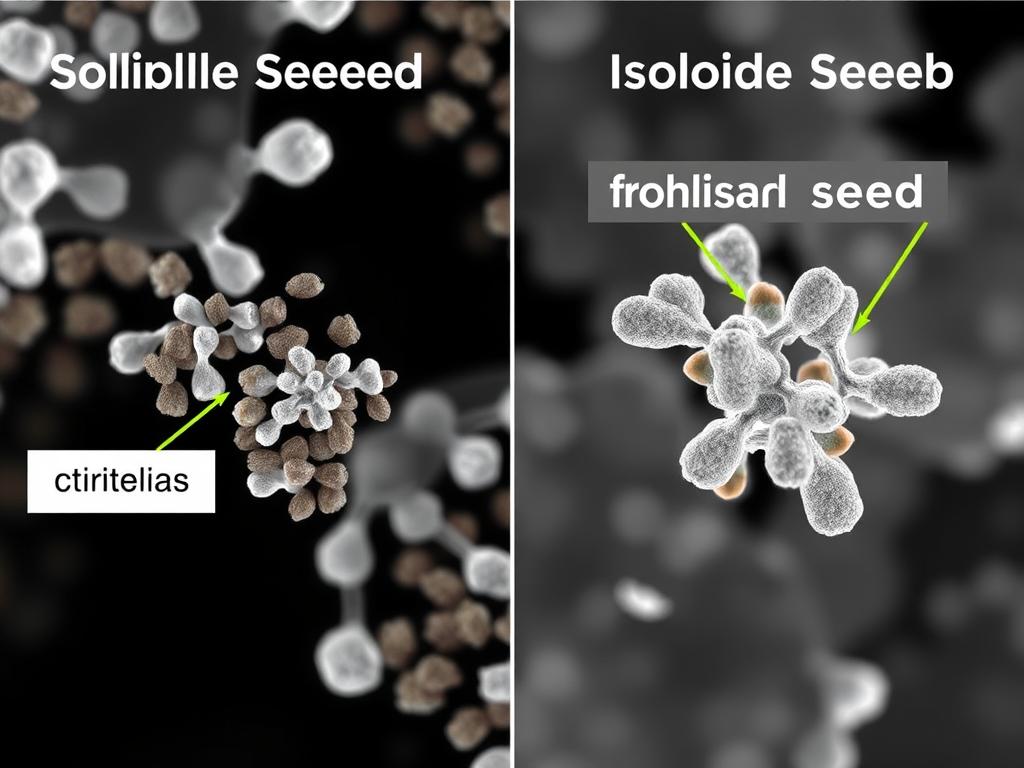
Microscopic view showing the different fiber structures in chia and flaxseeds
Dietary fiber is arguably the most important nutrient for gut health, and both chia seeds and flaxseeds are exceptional sources. However, they differ in the types and amounts of fiber they provide, which impacts their effects on digestive health.
Soluble vs. Insoluble Fiber
Both types of fiber are essential for optimal gut function but work in different ways:
Soluble Fiber
Dissolves in water to form a gel-like substance that:
- Slows digestion
- Increases feelings of fullness
- Feeds beneficial gut bacteria
- Helps regulate blood sugar
- Binds to cholesterol for elimination
Insoluble Fiber
Does not dissolve in water and:
- Adds bulk to stool
- Helps food pass more quickly through stomach and intestines
- Prevents constipation
- Supports regular bowel movements
- Helps maintain intestinal pH balance
Chia Seeds Fiber Profile
Chia seeds contain approximately 9.8 grams of fiber per 2 tablespoons (28g), which is about 35% of the daily recommended intake. Their fiber composition is:
- Soluble fiber: 7-15% of total fiber
- Insoluble fiber: 85-93% of total fiber
When exposed to liquid, chia seeds develop a unique gel-like coating due to their soluble fiber content. This mucilaginous property creates a soothing effect on the digestive tract and helps to slow digestion, which can be beneficial for nutrient absorption and blood sugar regulation.
Flaxseeds Fiber Profile
Flaxseeds provide about 5.6 grams of fiber per 2 tablespoons (20g), which is approximately 20% of the daily recommended intake. Their fiber composition is:
- Soluble fiber: 20-25% of total fiber
- Insoluble fiber: 75-80% of total fiber
While flaxseeds contain less total fiber than chia seeds, they have a higher proportion of soluble fiber. This makes them particularly effective at forming a gel in the digestive tract that can help regulate bowel movements and support the growth of beneficial bacteria.
Want to Improve Your Gut Health Naturally?
Subscribe to our weekly newsletter for expert tips, delicious recipes, and the latest research on optimizing your digestive wellness with superfoods like chia and flax seeds.
Impact on Gut Microbiota: Prebiotic Effects
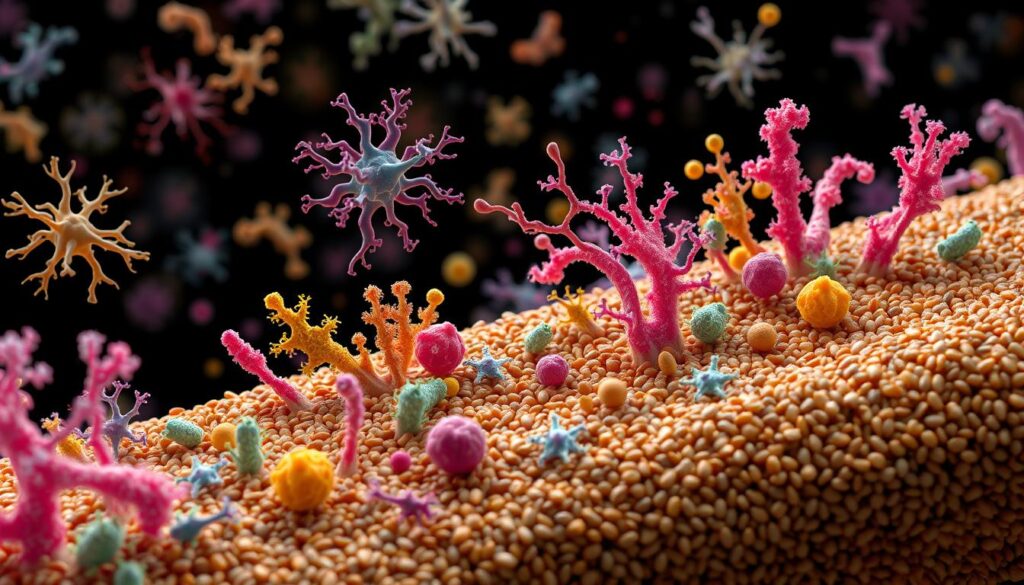
Beneficial gut bacteria thrive on the prebiotic fiber found in both seeds
A healthy gut microbiome is essential for overall digestive health and immune function. Both chia seeds and flaxseeds contain components that act as prebiotics—substances that feed beneficial gut bacteria and promote their growth.
Prebiotic Properties of Chia Seeds
Chia seeds contain fermentable fibers that serve as food for beneficial gut bacteria. When these bacteria ferment the fiber, they produce short-chain fatty acids (SCFAs) like butyrate, acetate, and propionate, which provide numerous benefits:
- Nourish colon cells
- Reduce inflammation in the gut
- Strengthen the intestinal barrier
- Help prevent leaky gut syndrome
- Support immune function
Research suggests that the specific type of fiber in chia seeds may promote the growth of Bifidobacteria and Lactobacillus species, which are associated with improved gut health and stronger immunity.
Prebiotic Properties of Flaxseeds
Flaxseeds are particularly rich in lignan precursors, which are transformed by gut bacteria into enterolignans. This process not only benefits the bacteria involved but also produces compounds with potential health benefits:
- Support for beneficial Bacteroidetes and Firmicutes bacteria
- Production of enterolignans with antioxidant properties
- Increased microbial diversity
- Enhanced production of butyrate (a beneficial SCFA)
- Reduced growth of pathogenic bacteria
Flaxseeds contain significantly more lignans than chia seeds, making them particularly effective at promoting a healthy balance of gut bacteria. In fact, flaxseeds are one of the richest dietary sources of lignans, containing up to 800 times more than most other foods.
Did you know? The prebiotic effects of both chia seeds and flaxseeds may help reduce gut inflammation and improve symptoms of irritable bowel syndrome (IBS) and inflammatory bowel disease (IBD).
Omega-3 Fatty Acids and Gut Inflammation

Alpha-linolenic acid (ALA) is the primary omega-3 fatty acid found in both seeds
Both chia seeds and flaxseeds are excellent plant-based sources of omega-3 fatty acids, specifically alpha-linolenic acid (ALA). These essential fatty acids play a crucial role in reducing inflammation throughout the body, including in the digestive tract.
Omega-3 Content Comparison
While both seeds are rich in ALA, there are notable differences in their omega-3 content:
- Flaxseeds contain approximately 6.5g of ALA per 2 tablespoons
- Chia seeds contain approximately 5g of ALA per 2 tablespoons
This makes flaxseeds slightly superior in terms of omega-3 content, providing about 30% more ALA than chia seeds per serving.
Anti-inflammatory Effects on Gut Health
The omega-3 fatty acids in both seeds help combat gut inflammation through several mechanisms:
- Reducing production of inflammatory cytokines
- Promoting the resolution of inflammation
- Supporting the integrity of the intestinal barrier
- Balancing the gut microbiome composition
- Modulating immune responses in the gut
For individuals with inflammatory bowel conditions like Crohn’s disease or ulcerative colitis, the anti-inflammatory properties of these seeds may help manage symptoms and support healing of the intestinal lining.
Bioavailability Considerations
An important factor in the chia seeds vs flaxseeds gut health benefits comparison is how well their nutrients are absorbed. While flaxseeds contain more omega-3s, they must be ground to make these fatty acids accessible to the body. The hard outer shell of whole flaxseeds can pass through the digestive tract undigested, limiting nutrient absorption.
Chia seeds, on the other hand, can be consumed whole, as their outer shell is permeable enough to allow for nutrient absorption. This gives chia seeds a potential advantage in terms of omega-3 bioavailability when consumed in their whole form.
“The anti-inflammatory effects of omega-3 fatty acids from sources like chia and flax seeds may be particularly beneficial for individuals with inflammatory gut conditions, helping to reduce symptoms and support healing of the intestinal lining.”
Comprehensive Comparison: Chia Seeds vs Flaxseeds for Gut Health
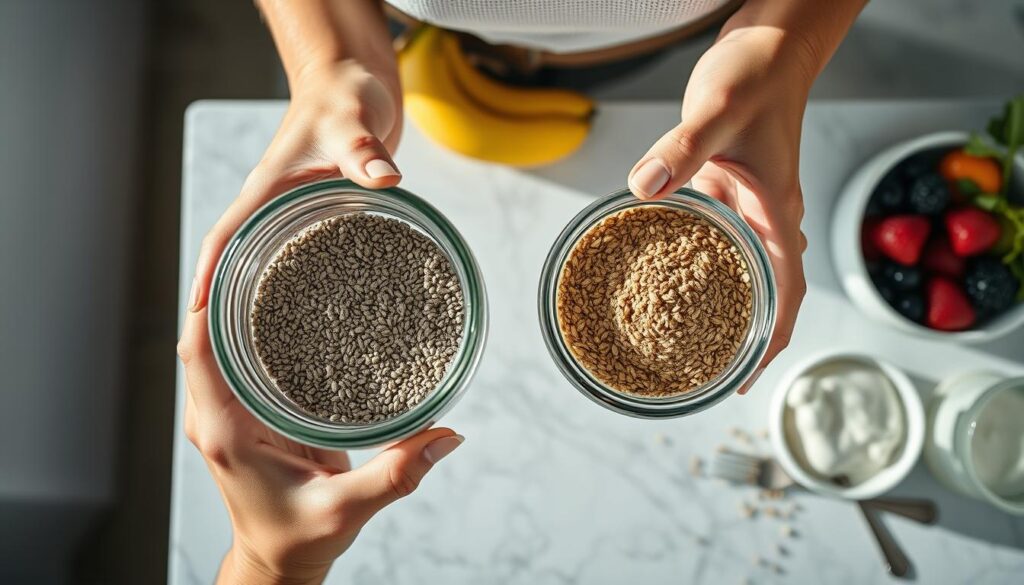
Proper preparation methods enhance the digestibility and nutritional benefits of both seeds
To help you make an informed decision in the chia seeds vs flaxseeds gut health benefits comparison, here’s a comprehensive overview of their key properties related to digestive wellness:
| Property | Chia Seeds | Flaxseeds |
| Total Fiber (per 2 tbsp) | 9.8g (35% DV) | 5.6g (20% DV) |
| Soluble Fiber Ratio | 7-15% of total fiber | 20-25% of total fiber |
| Omega-3 Fatty Acids | 5g ALA | 6.5g ALA |
| Antioxidant Levels | High (flavonoids, phenolic acids) | Very High (lignans, phenolic compounds) |
| Digestibility | Can be consumed whole | Must be ground for optimal absorption |
| Prebiotic Potential | High | Very High (due to lignan content) |
| Mucilage Formation | Very High (forms thick gel) | Moderate |
| Recommended Daily Intake | 1-2 tablespoons | 1-2 tablespoons (ground) |
Potential Side Effects and Considerations
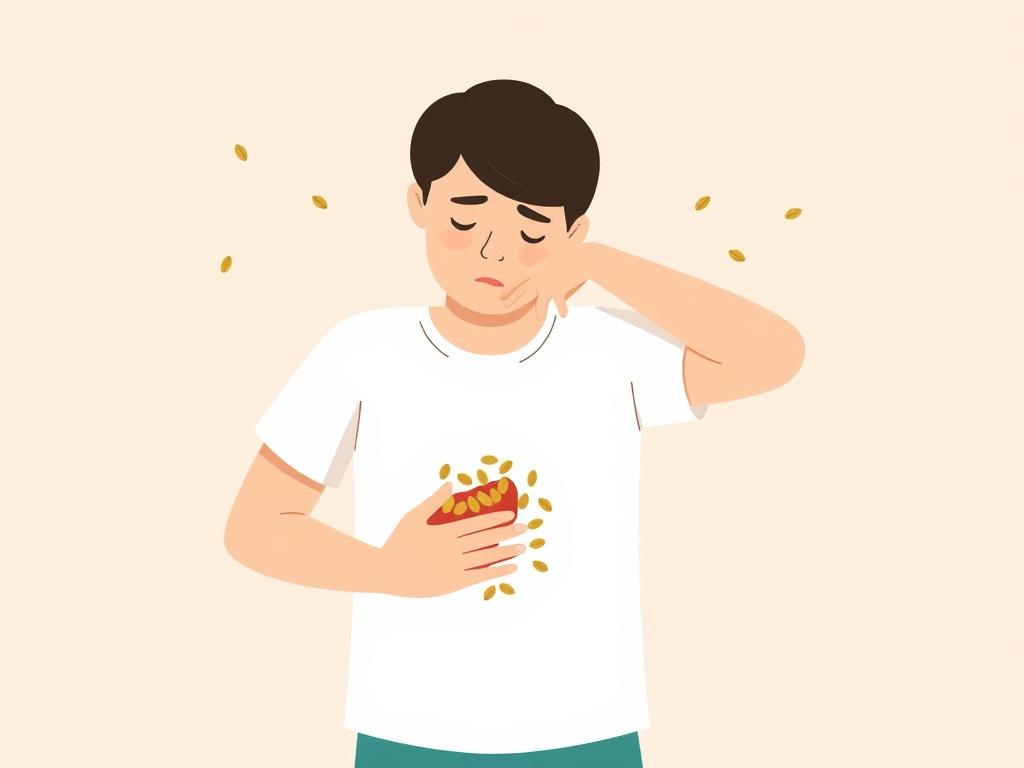
Starting with small amounts of either seed can help prevent digestive discomfort
While both chia seeds and flaxseeds offer impressive gut health benefits, there are some potential side effects and considerations to keep in mind:
Digestive Discomfort
The high fiber content in both seeds can cause digestive issues if consumed in large amounts, especially when first adding them to your diet:
Chia Seeds Potential Side Effects
- Bloating due to high fiber content
- Gas as gut bacteria adjust to increased fiber
- Abdominal discomfort if consumed dry without enough liquid
- Potential constipation if not consumed with adequate water
Flaxseeds Potential Side Effects
- Bloating and gas from increased fiber intake
- Diarrhea if consumed in large amounts
- Intestinal blockage risk if whole seeds are consumed without adequate fluid
- Potential hormonal effects due to high lignan content
Phytic Acid Content
Both chia seeds and flaxseeds contain phytic acid, an antinutrient that can bind to minerals like zinc, iron, and calcium, potentially reducing their absorption. However, this is generally only a concern if:
- You consume very large amounts of these seeds
- Your diet is already low in essential minerals
- You have existing nutrient deficiencies
The phytic acid content can be reduced by soaking, sprouting, or grinding the seeds before consumption.
Allergic Reactions
Though rare, allergic reactions to chia seeds or flaxseeds can occur. Symptoms may include:
- Skin rashes or hives
- Itching or swelling, particularly around the mouth
- Digestive distress
- Difficulty breathing (in severe cases)
If you experience any of these symptoms after consuming either seed, discontinue use and consult a healthcare provider.
Important: Both chia seeds and flaxseeds can interact with certain medications, including blood thinners, blood pressure medications, and diabetes drugs. Consult with a healthcare provider before adding significant amounts to your diet if you take prescription medications.
Usage Tips for Optimal Gut Health Benefits

Both seeds can be incorporated into a variety of foods to boost gut health
To maximize the gut health benefits in this chia seeds vs flaxseeds gut health benefits comparison, proper preparation and consumption methods are essential:
Preparation Methods
Chia Seeds
- Soaking: Mix 1 part chia seeds with 10 parts liquid and let sit for 30 minutes to form a gel
- Grinding: Optional but can increase nutrient absorption
- Sprouting: Rinse and place in a shallow dish with water for 2-3 days, rinsing twice daily
Flaxseeds
- Grinding: Essential for nutrient absorption; use a coffee or spice grinder
- Storage: Keep ground flaxseeds refrigerated to prevent rancidity
- Soaking: Optional but can help reduce phytic acid content
Incorporating Into Your Diet
Both seeds can be easily added to various foods to boost their nutritional value and gut health benefits:
Breakfast Ideas
- Stir into oatmeal or overnight oats
- Blend into smoothies
- Make chia pudding with plant milk
- Add to yogurt parfaits
- Sprinkle on top of cereal
- Mix into pancake or waffle batter
Main Meals
- Add to homemade salad dressings
- Sprinkle on salads for added crunch
- Use as an egg substitute in baking
- Incorporate into veggie burgers
- Add to soups and stews as a thickener
- Mix into homemade energy bars
Snacks & Desserts
- Blend into homemade energy balls
- Add to baked goods like muffins
- Mix into homemade granola
- Sprinkle on fruit salads
- Use as a topping for dark chocolate
- Add to homemade jam as a thickener
Optimal Daily Intake
For most healthy adults, the recommended daily intake is:
- Chia seeds: 1-2 tablespoons (15-30g) per day
- Flaxseeds: 1-2 tablespoons (10-20g) ground flaxseeds per day
Start with smaller amounts (1 teaspoon) and gradually increase to allow your digestive system to adjust to the higher fiber content. Always consume with plenty of water to prevent digestive discomfort and help the fiber work effectively.
Ready to Transform Your Gut Health?
Download our free 7-day gut health meal plan featuring delicious recipes with both chia seeds and flaxseeds to experience their combined benefits.
Synergistic Approach: Using Both Seeds Together
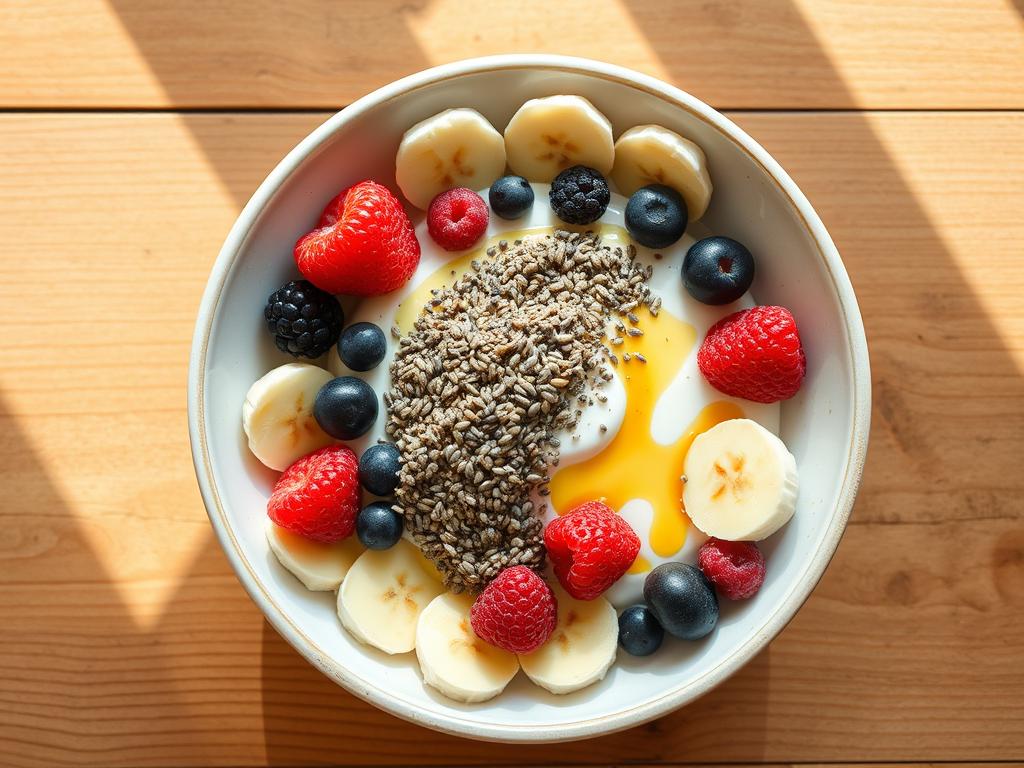
Combining both seeds can provide complementary gut health benefits
Rather than viewing the chia seeds vs flaxseeds gut health benefits comparison as an either/or decision, consider a synergistic approach that leverages the unique benefits of both seeds.
Complementary Benefits
Chia seeds and flaxseeds offer complementary properties that, when combined, can provide comprehensive gut health support:
- Chia’s higher total fiber content pairs well with flax’s higher proportion of soluble fiber
- Flaxseeds’ superior lignan content complements chia seeds’ higher mineral content
- Chia’s gel-forming properties work alongside flax’s omega-3 fatty acids to soothe the digestive tract
- The different prebiotic fibers in each seed may support diverse beneficial gut bacteria
Practical Combination Strategies
Here are some effective ways to incorporate both seeds into your diet:
- Morning power mix: Combine 1 teaspoon each of chia seeds and ground flaxseeds in yogurt or oatmeal
- Homemade seed blend: Create a mix of ground flaxseeds and whole chia seeds to sprinkle on foods
- Super smoothie booster: Add ½ tablespoon each to your daily smoothie
- Baking blend: Use a combination of both seeds in baked goods for enhanced nutrition
- Overnight seed pudding: Soak both seeds together in plant milk for a nutrient-dense breakfast
Pro Tip: For optimal digestion and nutrient absorption, consume ground flaxseeds and either whole or ground chia seeds with plenty of water or other fluids.
The Verdict: Which Seed Is Better for Gut Health?
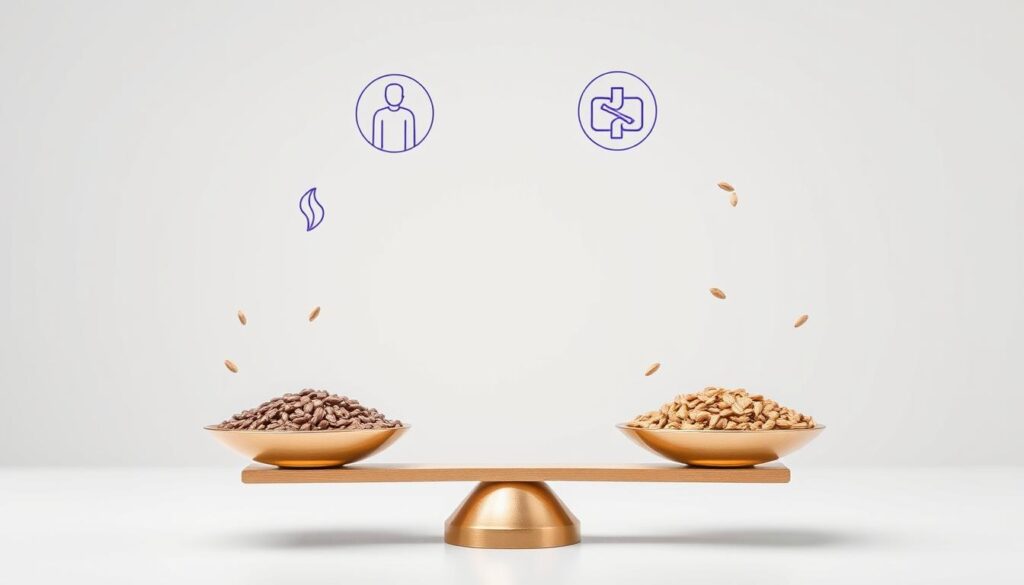
Both seeds offer valuable but slightly different benefits for gut health
After this comprehensive chia seeds vs flaxseeds gut health benefits comparison, the verdict depends on your specific gut health needs and goals:
Choose Chia Seeds If You Need:
- Higher overall fiber content
- Easier preparation (can be consumed whole)
- Strong gel-forming properties for constipation relief
- Higher calcium and phosphorus content
- Convenience of not having to grind before use
Choose Flaxseeds If You Need:
- Higher omega-3 fatty acid content
- More lignans for antioxidant benefits
- Higher proportion of soluble fiber
- Greater prebiotic potential for gut bacteria
- More budget-friendly option
Best for Specific Gut Health Scenarios
| Gut Health Concern | Better Option | Reason |
| Constipation | Chia Seeds | Higher total fiber content and strong gel-forming properties that help soften stool and promote regularity |
| Diarrhea | Flaxseeds | Higher proportion of soluble fiber that helps absorb excess water in the intestines |
| Gut Inflammation | Flaxseeds | Higher omega-3 content and lignan levels with anti-inflammatory properties |
| Microbiome Support | Both | Different prebiotic fibers support diverse beneficial bacteria populations |
| IBS | Start with Chia | May be gentler on sensitive digestive systems when properly soaked |
| Leaky Gut | Both | Combined anti-inflammatory and barrier-supporting properties |
Final Recommendation
For optimal gut health, consider incorporating both seeds into your diet in moderate amounts. This approach provides the comprehensive benefits of both while minimizing any potential downsides. Start with small amounts of each seed and gradually increase as your digestive system adjusts.
Remember that individual responses to foods can vary, so pay attention to how your body reacts and adjust accordingly. For those with specific digestive conditions or concerns, consulting with a healthcare provider or registered dietitian is always recommended before making significant dietary changes.
Enhance Your Gut Health Knowledge
Want to learn more about optimizing your gut microbiome naturally? Explore our comprehensive guide to building a healthier digestive system with evidence-based strategies.
Conclusion
Both chia seeds and flaxseeds offer impressive benefits for gut health, with each providing unique advantages. Chia seeds excel with their higher total fiber content and convenient preparation, while flaxseeds stand out for their superior omega-3 fatty acids and lignan content. The best approach for most people is to incorporate both seeds into a balanced diet, taking advantage of their complementary properties for comprehensive gut health support.
Whether you’re dealing with specific digestive issues or simply looking to optimize your gut health, these tiny nutritional powerhouses can make a significant difference when consumed regularly and properly. By understanding the nuances of the chia seeds vs flaxseeds gut health benefits comparison, you can make informed choices that best support your individual digestive wellness journey.

